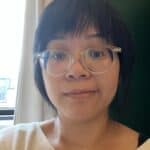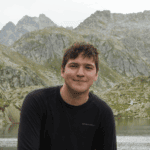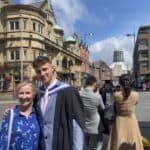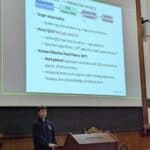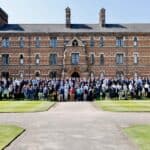Profile
Sam Godwood
-
About Me:
I live right in the centre of Liverpool. Most of the time I research physics , but outside of work I enjoy going to the gym , running , watching football (sadly no longer playing), and playing chess .
-
Read more
I grew up in a tiny village near Oxford, where I spent most of my childhood playing football and supporting Oxford United. But after living in Liverpool for the past 6 years, I’ve developed a soft spot for Liverpool FC too… When I’m not working, I love reading and watching films—especially anything directed by Christopher Nolan. Exercise has always been important to me; I used to focus on powerlifting, but now I hit the gym just for fun and relaxation. Running isn’t my favorite thing, but it keeps me fit and gives me a nice break from research. I absolutely love animals, and if my current flat allowed pets, I’d have lots of them.
-
My pronouns are:
He/him
-
My Work:
I research how quantum computers could help us learn more about some of the most mysterious (and confusing!) particles in the universe.
-
Read more
Quantum mechanics is one of the most confusing and unintuitive parts of physics—but it (almost) perfectly describes how very small things, like particles and atoms, interact and behave. That’s different from “classical” physics, which explains how big things (roughly the size of a grain of sand or larger) move and interact—think cars, planets, or even the phones we’re using right now. Because tiny particles follow quantum rules, trying to simulate them on a normal (classical) computer becomes impossibly slow: even calculating a handful of particles could take longer than the age of the universe!
In the 1980s, a very famous physicist Richard Feynman came up with a simple but revolutionary idea: build a computer that itself behaves quantum mechanically—a quantum computer!
Fifty years later, we’re still in the early days. Today’s machines have only a few dozen quantum bits (“qubits”) and are noisy (meaning they are very prone to errors), so we’re limited in what we can do. My research asks: what if we could program the kind of quantum computers we expect in the next 10–20 years to study one of the universe’s shyest particles—the neutrino?
Neutrinos are fundamental particles (they can’t be broken down into anything smaller) that barely ever interact with matter—trillions of them pass through your body every second without you noticing! Because they obey quantum mechanics and they’re so hard to catch, classical computers struggle to simulate their behaviour. By using quantum computers to simulate neutrinos, we hope to test theories and explore questions—like why the universe is made of more matter than antimatter or what really happens in a supernova—that are completely out of reach for today’s classical machines.
-
My Typical Day:
I wake up around 7:30am, have a quick breakfast , and then go to the gym or for a run . I’m usually at my desk by 10am, where I work until about 5:30pm. After that, I head home, make dinner , and relax until bedtime around 10:30pm .
-
Read more
Because my research is theoretical, I don’t have to spend any time working in a lab—which suits me perfectly! (Some people love lab work; I’m just not one of them ). This means I can choose where I work each day, apart from when I have meetings. Most days, I head to my desk in the physics building at Liverpool Uni, but if I want a change of scenery, I sometimes work in the library just around the corner. My work usually involves writing code, or scribbling equations on paper. I also collaborate with people in the United States, so once or twice a week I have Zoom meetings and work from home. Thankfully, my flat is only a 5-minute walk from the office, so on my way home I can easily pop into the shop to grab ingredients for dinner. From about 5:30pm, I get to relax—usually reading, watching TV, or having fun debates (always fun, never serious!) about physics, or pretty much anything, with my flatmate.
-
What I'd do with the prize money:
I’d use the prize money to make short, fun videos that explain weird and wonderful physics ideas—like quantum mechanics—that you don’t usually learn about in school unless you study physics at a higher level.
-
Education:
I went to Wood green School in Witney, Oxfordshire.
-
Qualifications:
I got my GCSEs (I was in the first year they changed the grades from letters to numbers!), then did 3 A levels. After that, I studied for a Master’s degree in Theoretical Physics, and now I’m doing a PhD.
-
Work History:
My first job was a paper round when I was about 12. Later on, I worked at Sainsbury’s from age 16 to 18, before heading off to university.
-
Current Job:
PhD researcher.
-
Employer:
University of Liverpool
-
My Interview
-
How would you describe yourself in 3 words?
Animal-loving quantum researcher
What did you want to be after you left school?
I had no idea! I just knew I enjoyed physics and wanted to learn more — and that led me here.
Were you ever in trouble at school?
Not too much, but probably more than I’d like to admit... I was always getting told off for talking too much and being noisy—which I still think was unfair
If you weren't doing this job, what would you choose instead?
If I’m allowed to cheat: probably another area of physics. But if not, I’d love to be involved in football somehow—maybe doing data analysis?
Who is your favourite singer or band?
Nirvana
What's your favourite food?
Any Mexican food!
If you had 3 wishes for yourself what would they be? - be honest!
Adopt a some animals and give them the best life, Oxford United in the Champions League, and three more because I can't think of any other's right now.
Tell us a joke.
Why can’t you trust an atom? Because they make up everything. (I'm not very good at jokes, unfair question)
-


